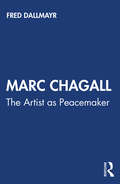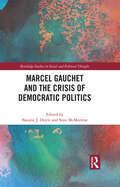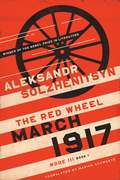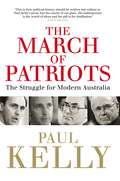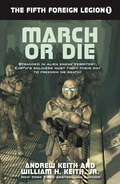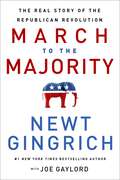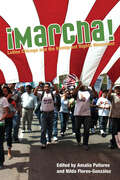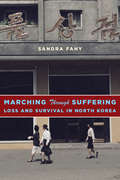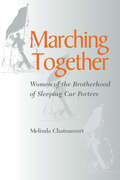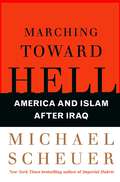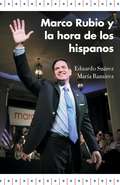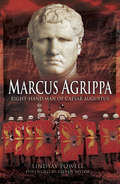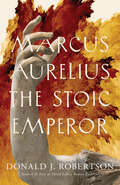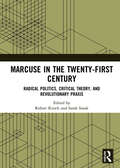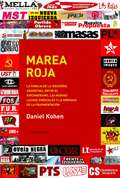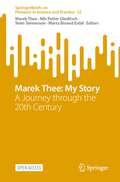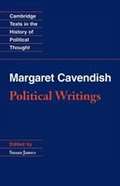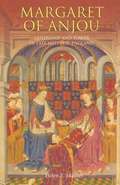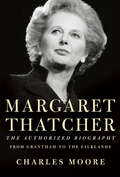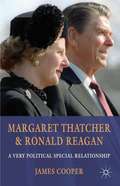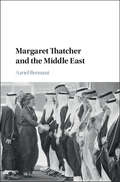- Table View
- List View
Marc Chagall: The Artist as Peacemaker (Peacemakers)
by Fred DallmayrThis book follows Chagall’s life through his art and his understanding of the role of the artist as a political being. It takes the reader through the different milieus of the nineteenth and twentieth centuries – including the World Wars and the Holocaust – to present a unique understanding of Chagall’s artistic vision of peace in an age of extremes. At a time when all identities are being subsumed into a “national” identity, this book makes the case for a larger understanding of art as a way of transcending materiality. The volume explores how Platonic notions of truth, goodness, and beauty are linked and mutually illuminating in Chagall’s work. A “spiritual-humanist” interpretation of his life and work renders Chagall’s opus more transparent and accessible to the general reader. It will be essential reading for students of art and art history, political philosophy, political science, and peace studies.
Marcel Gauchet and the Crisis of Democratic Politics (Routledge Studies in Social and Political Thought)
by Natalie J. DoyleThis book presents, for the first time in the English language, Marcel Gauchet’s interpretation of the challenges faced by contemporary Western societies as a result of the crisis of liberal democratic politics and the growing influence of populism. Responding to Gauchet’s analysis, international experts explore the depoliticising aspects of contemporary democratic culture that explain the appeal of populism: neo-liberal individualism, the cult of the individual and its related human rights, and the juridification of all human relationships. The book also provides the intellectual context within which Gauchet’s understanding of modern society has developed—in particular, his critical engagement with Marxism and the profound influence of Cornelius Castoriadis and Claude Lefort on his work. It highlights the way Gauchet’s work remains faithful to an understanding of history that stresses the role of humanity as a collective subject, while also seeking to account for both the historical novelty of contemporary individualism and the new form of alienation that radical modernity engenders. In doing so, the book also opens up new avenues for reflection on the political significance of the contemporary health crisis. Marcel Gauchet and the Crisis of Democratic Politics will be of great interest to scholars and postgraduate students of social and political thought, political anthropology and sociology, political philosophy, and political theory.
March 1917: The Red Wheel, Node III, Book 1 (The Center for Ethics and Culture Solzhenitsyn Series)
by Aleksandr Solzhenitsyn Marian SchwartzThe Red Wheel is Solzhenitsyn’s magnum opus about the Russian Revolution. Solzhenitsyn tells this story in the form of a historical novel, supplemented by newspaper headlines of the day, fragments of street action, cinematic screenplay, and historical overview.
March Of Patriots: The Struggle For Modern Australia
by Paul KellyThe March of Patriots is the inside story of how Paul Keating and John Howard changed Australia. It sees Keating and Howard as conviction politicians, tribal warriors and national interest patriots.Divided by belief, temperament and party, they were united by generation, city and the challenge to make Australia into a successful nation for the globalised age.This book is about the making of policy and the uses of power. It captures the authentic nature of Australian politics as distinct from the polemics advanced by both sides. Its focus is how Keating and Howard as Prime Ministers altered the nation's direction, redefined their parties and struggled over Australia's new economic, social, cultural and foreign policy agendas.A sequel to Paul Kelly's bestselling The End of Certainty, it is based on more than 100 interviews with the two key players, politicians, advisers and public servants. It relies heavily on 'on the record' disclosures and new documents from the period. Its theme is that Keating and Howard, as rivals and unrecognised collaborators, are best seen together, and that their legacy is impressive, contradictory and incomplete.
March or Die (The Fifth Foreign Legion)
by William H. Keith Jr. Andrew KeithThe epic story of a Senator’s rise and fall. Mark Coffin of California was barely thirty years old when he won a startling upset victory in his race for a seat in the U.S. Senate. A bright, handsome, energetic idealist with a passion for decency in government, he thought his honesty and dedication would see him through anything. But Washington, DC, was all too eager to teach him the hard lessons of gamesmanship and compromise. Neither Mark Coffin nor his wife were prepared for what Washington had in store for them: the bizarre sex scandal that would threaten to destroy not only Mark Coffin’s career and his personal life, but all of the political reforms he was fighting so desperately to achieve. Mark Coffin, U.S.S. is a magnificent novel of Washington politics—an insider’s view of power at the top, shown through the eyes of vivid, fascinating, and humanly likable characters. From Allen Drury, the master of spellbinding political fiction, author of Advise and Consent.
March to the Majority: The Real Story of the Republican Revolution
by Newt GingrichA NATIONAL BESTSELLER!New York Times bestselling author Newt Gingrich takes readers behind the scenes of the Republican Revolution in 1994 and the rise of the modern GOP to show how we can lead America toward a more conservative, prosperous future. The story of Gingrich&’s rise from college professor, to architect of the Contract with America, to Speaker of the U.S. House of Representatives is historic. There were many adventures, personalities, missteps, and victories on the road from a seemingly permanent House GOP minority to the first Republican majority in 40 years. These untold stories and inspiring lessons about the rise of modern conservatism are immensely relevant today as the United States faces profound and extraordinary challenges. Speaker of the House Newt Gingrich joins with former National Republican Congressional Committee Executive Director Joe Gaylord to bring alive the stories, events, and activities that led to the Contract with America and the first re-elected Republican majority since 1928. No two people are better positioned to tell this story than Gingrich and Gaylord. They were there, and they got it done. Gingrich and Gaylord share never-before-told stories about: Ronald Reagan Richard Nixon Tip O&’Neill George H.W. Bush Bill Clinton, and other fascinating political figures March to the Majority is not only about the past, but also about the challenges our nation faces today and offers principles for governing the American people.
Marcha: Latino Chicago and the Immigrant Rights Movement (Latinos in Chicago and Midwest)
by Leon Fink Elena R. Gutiérrez Nilda Flores-González Xóchitl Bada Frances R. Aparicio José Antonio Arellano David Bleeden Ralph Cintrón Stephen P Davis Caroline Gottschalk Druschke Juan R Martinez Sonia Oliva Irma M Olmedo Amalia Pallares José Perales-Ramos Leonard G Ramírez Michael Rodríguez Muñiz R. Stephen WarnerMarcha is a multidisciplinary survey of the individuals, organizations, and institutions that have given shape and power to the contemporary immigrant rights movement in Chicago. A city with longstanding historic ties to immigrant activism, Chicago has been the scene of a precedent-setting immigrant rights mobilization in 2006 and subsequent mobilizations in 2007 and 2008. Positing Chicago as a microcosm of the immigrant rights movement on national level, these essays plumb an extraordinarily rich set of data regarding recent immigrant rights activities, defining the cause as not just a local quest for citizenship rights, but a panethnic, transnational movement. The result is a timely volume likely to provoke debate and advance the national conversation about immigration in innovative ways.
Marching Through Suffering
by Sandra FahyMarching Through Suffering is a deeply personal portrait of the ravages of famine and totalitarian politics in modern North Korea since the 1990s. Featuring interviews with more than thirty North Koreans who defected to Seoul and Tokyo, the book explores the subjective experience of the nation's famine and its citizens' social and psychological strategies for coping with the regime.These oral testimonies show how ordinary North Koreans, from farmers and soldiers to students and diplomats, framed the mounting struggles and deaths surrounding them as the famine progressed. Following the development of the disaster, North Koreans deployed complex discursive strategies to rationalize the horror and hardship in their lives, practices that maintained citizens' loyalty to the regime during the famine and continue to sustain its rule today. Casting North Koreans as a diverse people with a vast capacity for adaptation rather than a monolithic entity passively enduring oppression, Marching Through Suffering positions personal history as a critical lens for interpreting political violence.
Marching Through Suffering: Loss and Survival in North Korea (Contemporary Asia in the World)
by Sandra FahyMarching Through Suffering is a deeply personal portrait of the ravages of famine and totalitarian politics in modern North Korea since the 1990s. Featuring interviews with more than thirty North Koreans who defected to Seoul and Tokyo, the book explores the subjective experience of the nation's famine and its citizens' social and psychological strategies for coping with the regime.These oral testimonies show how ordinary North Koreans, from farmers and soldiers to students and diplomats, framed the mounting struggles and deaths surrounding them as the famine progressed. Following the development of the disaster, North Koreans deployed complex discursive strategies to rationalize the horror and hardship in their lives, practices that maintained citizens' loyalty to the regime during the famine and continue to sustain its rule today. Casting North Koreans as a diverse people with a vast capacity for adaptation rather than as a monolithic entity passively enduring oppression, Marching Through Suffering positions personal history as key to the interpretation of political violence.
Marching Together: Women of the Brotherhood of Sleeping Car Porters (Women, Gender, and Sexuality in American History)
by Melinda ChateauvertThe Brotherhood of Sleeping Car Porters (BSCP) was the first national trade union for African Americans. Standard BSCP histories focus on the men who built the union. Yet the union's Ladies' Auxiliary played an essential role in shaping public debates over black manhood and unionization, setting political agendas for the black community, and crafting effective strategies to win racial and economic justice. Melinda Chateauvert explores the history of the Ladies' Auxiliary and the wives, daughters, and sisters of Pullman porters who made up its membership and used the union to claim respectability and citizenship. As she shows, the Auxiliary actively educated other women and children about the labor movement, staged consumer protests, and organized local and national civil rights campaigns ranging from the 1941 March on Washington to school integration to the Montgomery Bus Boycott. Chateauvert also sheds light on the plight of Pullman maids, who—relegated to the Auxiliary—found their problems as working women neglected in favor of the rhetoric of racial solidarity.
Marching Toward Hell
by Michael ScheuerMichael Scheuer is the author of Imperial Hubris, which was a New York Times hardcover bestseller for fifteen weeks and stirred up attention in every national and local media outlet. He is a veteran CIA counterterrorism analyst who for many years headed the Osama bin Laden unit. In Marching Toward Hell, Scheuer offers a scathing and frightening look at how the Iraq war has contributed to the enemy's strength and fundamentally changed the geopolitical landscape in a way that is harmful to U. S. interests and security concerns. Scheuer will examine the ways in which the war has widened the conflict by almost every measure, made America less secure, and left us all increasingly vulnerable to attack.
Marching Toward Hell: America and Islam After Iraq
by Michael ScheuerWhen Michael Scheuer first questioned the goals of the Iraq War in his 2004 bestseller Imperial Hubris, policymakers and ordinary citizens alike stood up and took notice. Now, Scheuer offers a scathing and frightening look at how the Iraq War has been a huge setback to America's War on Terror, making our enemy stronger and altering the geopolitical landscape in ways that are profoundly harmful to U.S. interests and security concerns. Marching Toward Hell is not just another attack on the Bush administration. Rather, it sounds a critical alarm that must be heard in order to preserve the nation's security. Scheuer outlines the ways that America's foreign policy since the end of the Cold War has undermined the very goals for which we are fighting and played right into bin Laden's hands. The ongoing instability in Iraq, for example, has provided al Qaeda and its allies with the one thing they want most: a safe haven from which to launch operations across borders into countries that were previously difficult for them to reach. With U.S. forces and resources spread thinner every day, the war has depleted our strength and brought al Qaeda a kind of success that it could not have achieved on its own. A twenty-plus-year CIA veteran, Scheuer headed the agency's Osama bin Laden unit, managed its covert-action operations, and authored its rendition program. Scheuer spent his career developing strategies to keep America safe, by any means deemed necessary by the presidents he served. It was his job to take available intelligence and devise plans to protect Americans, without considering bias, position, or even existing alliances. In Marching Toward Hell, Scheuer takes on the questions of "What went wrong?" and "How can we fix this?" and proposes a plan to cauterize the damage that has already been done and get American strategy back on track. He lists a number of painful recommendations for how we must shift our ideological, military, and political views in order to survive, even if that means disagreeing with Israeli policy or launching more brutal campaigns against terrorists. America holds its destiny in its hands, Scheuer says, yet not nearly enough has been done to defend America and destroy its Islamist enemies. This is an eye- opening, alarming, contentious, and ultimately fascinating examination of how far off track the War on Terror has gone, and a critical read in understanding what we must do to save it.
Marching to Freedom: The Story of Martin Luther King, Jr. (Famous Lives)
by Joyce MiltonA biography of the Baptist minister and civil rights leader whose practice of nonviolent civil disobedience helped African Americans win many battles for equal rights.
Marco Rubio y la hora de los hispanos
by Eduardo Suárez María RamírezMarco Rubio es el primer hispano en la historia con serias opciones de llegar a la Casa Blanca. Hijo de inmigrantes que huyeron de Cuba antes de la llegada del castrismo y que se quedaron a medio camino de hacer realidad el sueño americano, Rubio es una figura con una fuerte carga simbólica. <P><P>Su padre nunca pasó de camarero y su madre limpiaba hoteles en Las Vegas o Miami, pero Marco se interesó desde adolescente por la política escuchando a un abuelo que admiraba a Ronald Reagan. Se graduó en la universidad e hizo carrera política desde los cargos más modestos en Miami. <P> Su ascenso dentro del partido republicano tiene que ver con su capacidad retórica y su habilidad para adaptarse a cualquier situación. Llegó al Senado como uno de los favoritos del sector más conservador y poco a poco se ha ido moviendo hacia posiciones más centristas, abanderando la reforma migratoria que podría legalizar a millones de inmigrantes indocumentados. Su trayectoria simboliza de modo inmejorable el auge de la comunidad hispana, y permite retratar a la vez a un joven y ambicioso político y a la joven y ambiciosa comunidad a la que representa, para ofrecer una imagen poliédrica del país más importante del mundo y el papel que los hispanos desempeñan allí.
Marco Rubio y la hora de los hispanos
by Eduardo SuárezMarco Rubio es el primer hispano en la historia con serias opciones de llegar a la Casa Blanca. Hijo de inmigrantes que huyeron de Cuba antes de la llegada del castrismo y que se quedaron a medio camino de hacer realidad el sueño americano, Rubio es una figura con una fuerte carga simbólica. Su padre nunca pasó de camarero y su madre limpiaba hoteles en Las Vegas o Miami, pero Marco se interesó desde adolescente por la política escuchando a un abuelo que admiraba a Ronald Reagan. Se graduó en la universidad e hizo carrera política desde los cargos más modestos en Miami. Su ascenso dentro del partido republicano tiene que ver con su capacidad retórica y su habilidad para adaptarse a cualquier situación. Llegó al Senado como uno de los favoritos del sector más conservador y poco a poco se ha ido moviendo hacia posiciones más centristas, abanderando la reforma migratoria que podría legalizar a millones de inmigrantes indocumentados. Su trayectoria simboliza de modo inmejorable el auge de la comunidad hispana, y permite retratar a la vez a un joven y ambicioso político y a la joven y ambiciosa comunidad a la que representa, para ofrecer una imagen poliédrica del país más importante del mundo y el papel que los hispanos desempeñan allí.
Marcus Agrippa: Right-Hand Man of Caesar Augustus
by Lindsay PowellThe authoritative biography of the ancient Roman general and loyal deputy to Emperor Augustus by the acclaimed historian and author of Augustus at War. When Gaius Octavius became the first emperor of Rome, Marcus Agrippa was by his side. As the emperor&’s loyal deputy, he waged wars, pacified provinces, beautified Rome, and played a crucial role in establishing the Pax Romana—but he always served knowing that he would never rule in his own name. Why he did so, and never grasped power for himself, has perplexed historians for centuries. In this authoritative biography, historian Lindsay Powell offers a penetrating new assessment of Agrippa&’s life and achievements. Following Caesar&’s assassination, Agrippa was instrumental in asserting the rights of his friend Gaius Octavius as the dictator&’s heir, seeing him crowned Emperor Augustus. Agrippa then established a reputation as a bold admiral, defeating Marcus Antonius and Queen Cleopatra at the Battle of Actium, and ending bloody rebellions in the Cimmerian Bosporus, Gaul, Hispania, and Illyricum. Agrippa was also an influential statesman and architect. He established the vital road network that turned Julius Caesar&’s conquests into viable provinces, overhauled Rome&’s drains and aqueducts, and built the original Pantheon. Marrying Augustus&’s daughter, Julia the Elder, Agrippa became co-ruler of the Roman Empire until his death in 12 BC. His bloodline lived on in the imperial family, through Agrippina the Elder, his grandson Caligula, and great-grandson Nero.
Marcus Aurelius: The Stoic Emperor (Ancient Lives)
by Donald J. RobertsonExperience the world of Roman emperor Marcus Aurelius and the tremendous challenges he faced and overcame with the help of Stoic philosophy This novel biography brings Marcus Aurelius (121–180 CE) to life for a new generation of readers by exploring the emperor&’s fascinating psychological journey. Donald J. Robertson examines Marcus&’s relationships with key figures in his life, such as his mother, Domitia Lucilla, and the emperor Hadrian, as well as his Stoic tutors. He draws extensively on Marcus&’s own Meditations and correspondence, and he examines the emperor&’s actions as detailed in the Augustan History and other ancient texts. Marcus Aurelius struggled to reconcile his philosophy and moral values with the political pressures he faced as emperor at the height of Roman power. Robertson examines Marcus&’s attitude toward slavery and the moral dilemma posed by capturing enemies in warfare; his attitude toward women; the role of Stoicism in shaping his response to the threat of civil war; the treatment of Christians under his rule; and the naming of his notorious son Commodus as his successor. Throughout, the Meditations is used to shed light on the mind of the emperor—his character, values, and motives—as Robertson skillfully weaves together Marcus&’s inner journey as a philosopher with the outer events of his life as a Roman emperor.
Marcuse in the Twenty-First Century: Radical Politics, Critical Theory, and Revolutionary Praxis
by Robert Kirsch and Sarah SurakThis book engages the critical theory of political philosopher Herbert Marcuse to imagine spaces of resistance and liberation from the repressive forces of late capitalism. Marcuse, an influential counterculture voice in the 1960s, highlighted the "smooth democratic unfreedom" of postwar capitalism, a critique that is well adapted to the current context. The compilation begins with a previously unpublished lecture delivered by Marcuse in 1966 addressing the inadequacy of philosophy in its current form, arguing how it may be a force for liberation and social change. This lecture provides a theoretical mandate for the volume’s original contributions from international scholars engaging how topics such as higher education, aesthetics, and political organization can contribute to the project of building a critical rationality for a qualitatively better world, offering an alternative to the bleak landscape of neoliberalism. The essays in this volume as whole engage the current context with an urgency appropriate to the problems facing an encroaching authoritarianism in political society with an interdisciplinary lens that speaks to the complexity of the problems facing modern society. The chapters originally published as a special issue in New Political Science.
Marea roja: La familia de la izquierda argentina. Entre el Kirchnerismo, las nuevas luchas s
by Daniel KohenCon una exhaustiva investigación de fondo y un excelente modo de narrar, el autor analiza qué es hoy la izquierda y echa luz sobre los rasgos que la unifican y la fragmentan, y sobre las rememoraciones que componen su santoral. La familia de la izquierda argentina. Entre el Kirchnerismo, las nuevas luchas sindicales y la amenaza de la fragmentación. ¿Qué lugar ha ocupado la izquierda argentina en la coyuntura socio- política de la última década? Cada vez que estalla un conflicto social en nuestro país, en el centro de la escena se puede distinguir a la izquierda argentina que oscila entre las tapas de los principales diarios y el más puro ostracismo. Conflictos como el lock-out de las entidades del campo, las peleas gremiales en el subterráneo de la ciudad de Buenos Aires, las elecciones en la UBA, la crisis del 2001, la política de derechos humanos durante la administración K y el conflicto en la ex Terrabusi, solo por nombrar algunos de los hechos en los cuales la izquierda tuvo un lugar protagónico. ¿Pero cuál es su verdadero rol y su influencia?Daniel Kohen analiza e interpreta la ideología, los modosy el accionar de este actor político en los últimos convulsionados años de la Argentina, a la vez que propone un estudio de las características y los modos de operar de los más de cuarenta partidos y grupos que conforman lo que el autor llama la familia leninista.
Marek Thee: A Journey through the 20th Century (SpringerBriefs on Pioneers in Science and Practice #32)
by Nils Petter Gleditsch Marta Bivand Erdal Stein Tønnesson Marek TheeMarek Thee was a Jewish Polish journalist, scholar, and activist. This book tells his life from narrowly escaping death in the Holocaust to exile in Palestine, where he became attached to the Polish consular service. On his return to Poland in 1950, he worked for the Foreign Ministry and later for the Polish Institute for International Affairs. He served as Head of the Polish delegation to the International Control Commission in Indochina in the late 1950s. In 1968 he lost his job and his Polish citizenship in a nationalistic and antisemitic campaign. He was able to move to Norway where he worked for twenty years at the Peace Research Institute Oslo (PRIO), editing an international quarterly journal, Bulletin of Peace Proposals and doing research on the arms race. In retirement, he continued his research and writing at the Norwegian Human Rights Institute. The book vividly relates the drama of his life in Poland, Palestine, Indochina, and Norway.This is an open access book.
Margaret Cavendish: Political Writings (Cambridge Texts in the History of Political Thought)
by Margaret Cavendish Susan JamesMargaret Cavendish, Duchess of Newcastle, published a wide variety of works including poems, plays, letters and treatises of natural philosophy, but her significance as a political writer has only recently been recognised. <P><P>This major contribution to the series of Cambridge Texts includes the first ever modern edition of her Divers Orations on English social and political life, together with a new student-friendly rendition of her imaginary voyage, A New World called the Blazing World. Susan James explains the allusions made in this classic text, and directs readers to the many intellectual debates with which Cavendish engages. Together these two works reveal the character and scope of Margaret Cavendish's political thought. She emerges as a singular and probing writer, who simultaneously upholds a conservative social and political order and destabilises it through her critical and unresolved observations about natural philosophy, scientific institutions, religion, and the relations between men and women.
Margaret Of Anjou: Queenship and Power in Late Medieval England
by Helen E. MaurerMargaret of Anjou was a vengeful and violent woman, or so we have been told, whose vindictive spirit fuelled the fifteenth-century dynastic conflict, the Wars of the Roses. In Shakespeare's rendering she becomes an adulterous queen who mocks her captive enemy, Richard, duke of York, before killing him in cold blood. Shakespeare's portrayal has proved to be remarkably resilient, because Margaret's queenship lends itself to such an assessment. In 1445, at the age of fifteen, she was married to the ineffectual Henry VI, a move expected to ensure peace with France and an heir to the throne. Eight years later, while she was in the later stages of her only pregnancy, Henry suffered a complete mental collapse that left him catatonic for roughly a year and a half: Margaret came to the political forefront. In the aftermath of the king's illness, she became an indefatigable leader of the Lancastrian loyalists in their struggle against their Yorkist opponents. Margaret's exercise of power was always fraught with difficulty: as a woman, her effective power was dependent upon her invocation of the authority of her husband or her son. Her enemies lost no opportunity to charge her with misconduct of all kinds. More than five hundred years after Margaret's death this examination of her life and career allows a more balanced and detached view.
Margaret Thatcher
by Charles MooreWith unequaled authority and dramatic detail, the first volume of Charles Moore's authorized biography of Margaret Thatcher reveals as never before the early life, rise to power, and first years as prime minister of the woman who transformed Britain and the world in the late twentieth century. Moore has had unique access to all of Thatcher's private and governmental papers, and interviewed her and her family extensively for this book. Many of her former colleagues and intimates have also shared previously unseen papers, diaries, and letters, and spoken frankly to him, knowing that what they revealed would not be published until after her death. The book immediately supersedes all other biographies and sheds much new light on the whole spectrum of British political life from Thatcher's entry into Parliament in 1959 to what was arguably the zenith of her power--victory in the Falklands in 1982. Drawing on an extraordinary cache of letters to her sister Muriel, Moore illuminates Thatcher's youth, her relationship with her parents, and her early romantic attachments, including her first encounters with Denis Thatcher and their courtship and marriage. Moore brilliantly depicts her determination and boldness from the very beginning of her political career and gives the fullest account of her wresting the Tory leadership from former prime minister Edward Heath at a moment when no senior figure in the party dared to challenge him. His account of Thatcher's dramatic relationship with Ronald Reagan is riveting. This book also explores in compelling detail the obstacles and indignities that Thatcher encountered as a woman in what was still overwhelmingly a man's world. Moore's admiration for Thatcher is evident, yet his portrait is convincingly clear-eyed, conveying both how remarkable she was and how infuriating she could be, her extraordinary grasp at mastering policy and what needed to be done, and her surprising vulnerabilities. At the moment when Margaret Thatcher becomes a part of history, Moore's portrait enlivens her, compellingly re-creating the circumstances and experiences that shaped one of the most significant world leaders of the postwar era.
Margaret Thatcher and Ronald Reagan
by James CooperA new exploration of the relationship between the Margaret Thatcher and Ronald Reagan administrations in domestic policy. Using recently released documentary material and extensive research interviews, James Cooper demonstrates how specific policy transfer between these 'political soul mates' was more limited than is typically assumed.
Margaret Thatcher and the Middle East
by Azriel BermantMargaret Thatcher and the Middle East examines Thatcher's policy on the Middle East, with a spotlight on her approach towards the Israeli-Palestinian conflict. It questions claims that she sought to counter the Foreign Office Middle East policy, and maintains that the prime minister was actually in close agreement with the Whitehall bureaucracy on the Arab-Israeli conflict. In particular, the volume argues that Thatcher's concerns over Soviet ambitions in the Middle East encouraged her to oppose the policies of Israel's Likud governments, and to work actively for an urgent resolution of the conflict. Furthermore, while Thatcher was strongly pro-American, this was not translated into automatic support for Israel. Indeed, the Thatcher government was very much at odds with the Reagan administration over the Middle East, as a result of Washington's neglect of the forces of moderation in the region.
